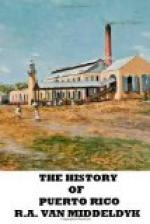“9. You are aware that ever since the sacraments have been administered in these islands, storms and earthquakes have ceased. Let a chapel be built at once with the advocation of Saint John the Baptist, and a monastery, though it be a small one, for Franciscan friars, whose doctrine is very salutary.
“10. Have great care in the mines and continually advise Pasamonte (the treasurer) or his agent of what happens or what may be necessary.
“11. Take the youngest Indians and teach them the Christian doctrine; they can afterward teach the others with better results.
“12. Let there be no swearing or blasphemy; impose heavy penalties thereon.
“13. Do not let the Indians be overloaded, but be well treated rather.
“14. Try to keep the Caribs from coming to the island, and report what measures it will be advisable to adopt against them. To make the natives do what is wanted, it will be convenient to take from them, with cunning (con mana), all the canoes they possess.
“15. You will obey the contents of these instructions until further orders.
Tordesillas, 25th of July, 1511.
F., King.”
It is clear from the above instructions that, in the king’s mind, there was no inconsistency in making the Indians work in the mines and their good treatment. There can be no doubt that both he and Dona Juana, his daughter, who, as heir to her mother, exercised the royal authority with him, sincerely desired the well-being of the natives as far as compatible with the exigencies of the treasury.
For the increase of the white population and the development of commerce and agriculture, liberal measures, according to the ideas of the age, were dictated as early as February, 1511, when the same commercial and political franchises were granted to San Juan as to la Espanola.
On July 25th the price of salt, the sale of which was a royal monopoly, was reduced by one-half, and in October of the same year the following rights and privileges were decreed by the king and published by the crown officers in Seville:
“1st. Any one may take provisions and merchandise to San Juan, which is now being settled, and reside there with the same freedom as in la Espanola.
“2d. Any Spaniard may freely go to the Indies—that is, to la Espanola and to San Juan—by simply presenting himself to the officials in Seville, without giving any further information (about himself).
“3d. Any Spaniard may take to the Indies what arms he wishes, notwithstanding the prohibition.
“4th. His Highness abolishes the contribution by the owners of one ‘castellano’ for every Indian, they possess.
“5th. Those to whom the Admiral grants permission to bring Indians (from other islands) and who used to pay the fifth of their value (to the royal treasurer) shall be allowed to bring them free.
“6th. Indians once given to any person shall never be taken from him, except for delinquencies, punishable by forfeiture of property.




